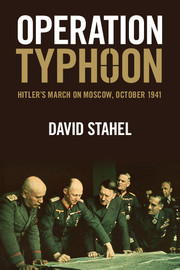Book contents
- Frontmatter
- Contents
- List of illustrations
- List of maps
- List of tables
- Acknowledgements
- Glossary
- Tables of military ranks and army structures
- Introduction
- 1 Contextualising Barbarossa
- 2 Operation Typhoon
- 3 Viaz'ma and Briansk
- 4 Carnage on the road to Moscow
- 5 Bock's final triumph
- 6 Exploiting the breach
- 7 Weathering the storm
- 8 Running on empty
- 9 The eye of the storm
- Conclusion
- Notes
- Bibliography
- Index
4 - Carnage on the road to Moscow
Published online by Cambridge University Press: 05 March 2013
- Frontmatter
- Contents
- List of illustrations
- List of maps
- List of tables
- Acknowledgements
- Glossary
- Tables of military ranks and army structures
- Introduction
- 1 Contextualising Barbarossa
- 2 Operation Typhoon
- 3 Viaz'ma and Briansk
- 4 Carnage on the road to Moscow
- 5 Bock's final triumph
- 6 Exploiting the breach
- 7 Weathering the storm
- 8 Running on empty
- 9 The eye of the storm
- Conclusion
- Notes
- Bibliography
- Index
Summary
Making a killing at Viaz'ma and Briansk – the pockets contract
As Hitler's Germany extolled its victory in the east, the mood at Army Group Centre was equally euphoric. The chief of the Operations Department in the Army General Staff, Colonel Adolf Heusinger, visited Army Group Centre together with Brauchitsch immediately after the closing of the pocket at Viaz'ma and wrote of the prevailing ‘high spirits’. Heusinger discussed the situation with Greiffenberg, Bock's chief of staff, and Lieutenant-Colonel Henning von Tresckow, the first general-staff officer of Army Group Centre, and they agreed that ‘another three weeks’ were needed, ‘then it will have been done’. Brauchitsch was also buoyed by the success and assured Bock that ‘this time it was different than at Minsk and Smolensk’. According to Blumentritt:
It is hardly surprising that Hitler, his commanders and his troops themselves now believed that the Red Army must be nearing the end of its resources both in manpower and in weapons . . . Great optimism prevailed in Army Group Centre, and from Field Marshal von Bock to the privates at the front we all believed and hoped that we would soon be marching through the streets of the Russian capital.
Heusinger and Brauchitsch flew back to the OKH just as the rain and mud were transforming the roads and fields of the east, but for the army command an end to major operations in the east seemed at last within reach. Heusinger noted on 14 October that ‘individual expeditions’ to the Caucasus and Egypt would replace ‘large ground operations’. Moreover, Heusinger determined that in the future ‘the continuation of the war will be left to the Luftwaffe and the U-boat’. With such expectations one may assume that Dietrich's speech on 9 October came as little surprise to the men of the OKH, yet the regime's public declaration of victory angered many within the army command even though they were, for the most part, in agreement with its conclusion. Heusinger denounced what he referred to as ‘this bragging and especially prophesying’ of victory, even though he maintained that the opposing Soviet forces were now largely ‘untrained [men] or half-children’.
- Type
- Chapter
- Information
- Operation TyphoonHitler's March on Moscow, October 1941, pp. 111 - 141Publisher: Cambridge University PressPrint publication year: 2013



